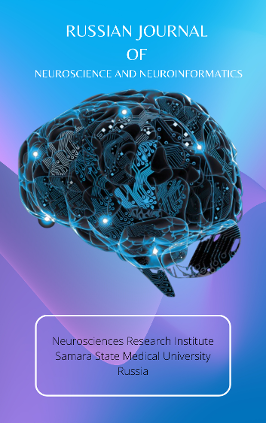Russian Journal of Neuroscience
and
Neuroinformatics
(Russian. J. Neurosci. Neuroinform.)
ISSN: Under Process
Editor
Dr Saikat Gochhait
Symbiosis International Deemed University, India
&
Neuro Sciences Research Institute Samara State Medical, University, Russia
Published in London, UK by Roman Science Publications
Journal Metrics
Acceptance to publication: 45 days
Cite Score : Not Available Yet

Research in Neuroinformatics emphasizes data structure and software tools related to analysis, modeling, integration, and sharing in all areas of neuroscience. The editors particularly invite contributions on: (1) Theory and methodology, including discussions on ontologies, modeling approaches, database design, and meta-analyses; (2) Descriptions of developed databases and software tools like MATLAB, and of the methods for their distribution; (3) Relevant experimental results, such as reports accompanied by the release of massive data sets; (4) Computational simulations of models integrating and organizing complex data; and (5) Neuroengineering approaches, including hardware, robotics, and information theory studies.
Also, Neuroinformatics publishes independent "tests and evaluations" of neuroscience databases, software tools, and fosters a commitment to data sharing.
Call for Paper
This inter-, multi-, and transdisciplinary tackles neural computing, metaheuristics, and artificial intelligence (AI), bridging neuroscience, humanities, social, technological, exact and biological sciences gaps. This SI assents research and surveys theoretical and practical aspects, focusing on these neuroscience intelligent computational systems’ topics: AI models, mathematical/computational theories, perception, affection, incentive, all types of neural networks, learning, algorithms, architectures, performance metrics, benchmarks, quality of neuroservices plus their impact on all stakeholders, applied statistics, simulations, virtualization, hardware implementations, systemic multidisciplinary integration, innovative efforts, theoretical/deployment/computational practices boosting/sustaining systems development besides how AI influences body functions (theragnostics), neuronal sets, cells, and sub-cellular structures. Topics comprise but are not restricted to the subsequent computational, theoretical, experimental, clinical and applied traits provided they use computational intelligence:
- Neural modeling and computation;
- Neural single- and multimodality signal processing;
- Brain-computer interfacing and wave analysis;
- Neuron-electronics;
- Neurofeedback, neural rehabilitation;
- Neuroinformatics;
- Neuroimaging (fMRI, EEG, MEG, PET, NIR, and other modalities);
- Neural circuits: artificial, biological, and hybrid;
- Neural control and neural system analysis;
- Learning theory (e.g., supervised/semi-supervised/unsupervised/reinforcement learning);
- Knowledge-based neural networks, probabilistic, spatial, temporal, and semantic knowledge representation and reasoning;
- Classifiers
- Neural network, fuzzy systems, and evolutionary hybrids algorithms;
- Biologically-inspired intelligent agents (e.g., architectures, settings, adaptation/ learning, and knowledge administration);
- Bayesian networks and reasoning;
- Algorithms relying on swarm intelligence and ant colony optimization (ACO);
- Multi-agent frameworks;
- Perceptual systems computational characteristics regarding visual, auditory, intuitive, and tactile sensing modalities;
- Selective attention;
- Long-term, short-term, and operational memory using CI;
- Multi-level cognitive phenomena analyses from the neural, theragnostics, psychological, and computational points of view;
- Fusion of natural and artificial cognitive systems theories;
- Information-, control-, and decision-theoretic tactics to neuroscience theragnostics and Neuroscience-as-a-Service (NaaS);
- NaaS aspects regarding Cloud, Fog, and Edge Computing;
- Methodologies oriented towards creativity (such as learning, knowledge, inference, emotion, motivation, awareness, perception, intuition, decision-making, action); and
- Cognition for artificial life, from dynamical and complex systems perspectives.
Acceptable contributions entail original research or review articles. Manuscripts should possess high quality on significant developmental, practical usage, and value. Decisions will hinge on originality, technical soundness, exposition clarity, scientific merit, and the multidisciplinary impact of the article.
Manuscript submission information
Deadline: 15 Aug 2023
Final Decision: 15 Sep 2023
For questions about submissions, please email Dr Saikat Gochhait, Email: saikat.gochhait@sidtm.edu.in
Keywords:
Artificial Intelligence, Neuroscience (miscellaneous), Health Informatics, Theragnostics, Computational Intelligence, Metaheuristics, Signal Processing, Machine Learning, Terahertz Electromagnetic, Nuclear Medicine and Imaging, Nuclear/Ultrasound Technology, Clinical Neurology, Neurology, Surgery, Critical Care and Intensive Care Medicine
Why publish in this Journal?
• Grant Supports
• Collaborating with Neurosciences Research Institute, Samara State Medical University, Russia.
Submission: Authors are requested to submit article electronically via saikat.gochhait@sidtm.edu.in
Article Processing Charges: No article processing fee in the journal. All articles published in our journals are open access and freely available online, immediately upon publication.
License: Creative Commons 4.0
Indexing and Abstracting: The journal will be index in all major indexing.
Frequency: Two issues per year.
Plagiarism: All the articles will be check through Turnitin Software before the publication of the journal.
Retractions: Retractions are considered
by journal editors in cases of evidence of unreliable data or findings,
plagiarism, duplicate publication, and unethical research. We may consider an
expression of concern notice if an article is under investigation. All retraction
notices will explain why the article was retracted. The retraction procedure
depends on the publication stage of the article.
Review Process: This
journal uses double-blind review,
which means that both the reviewer and author identities are concealed from the
reviewers, and vice versa, throughout the review process. The articles is submitted to minimum 3 reviewers specialize on the topic for their reviews.
Publications Ethics and Publication Malpractice Statement